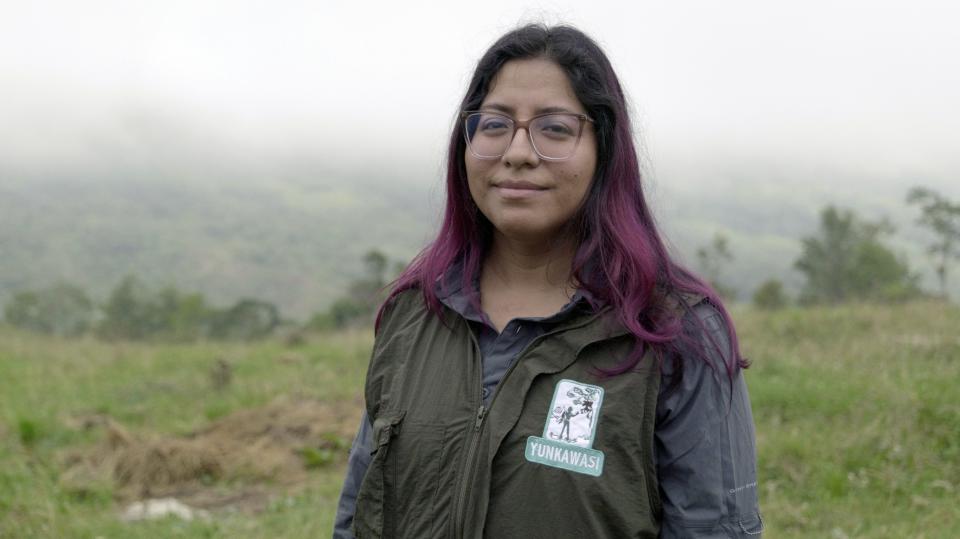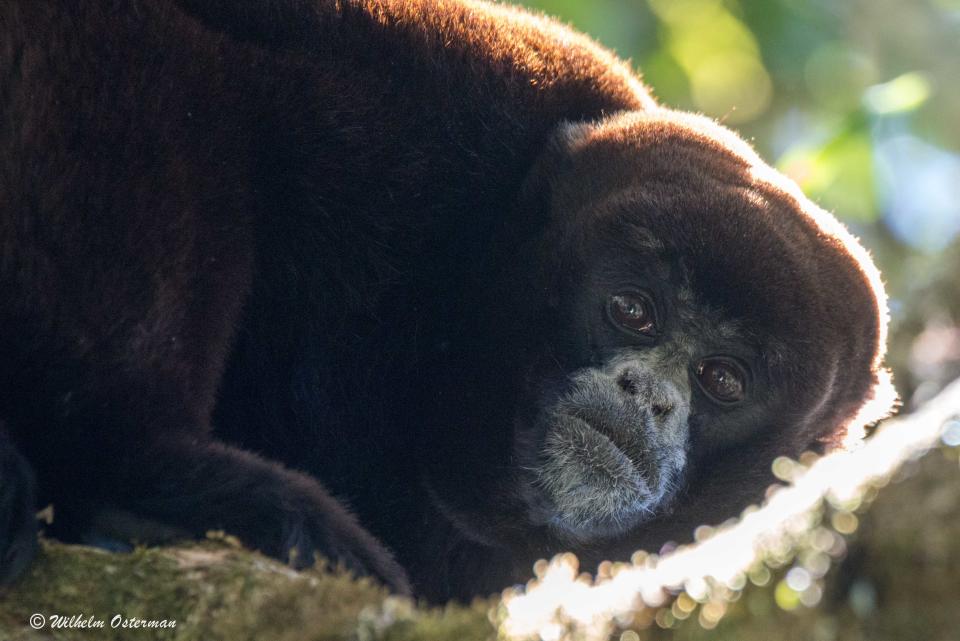Indianapolis Zoological Society names winner of inaugural Emerging Conservationist Award
Fanny Cornejo, the leader of an organization working to develop healthy ecosystems for the rare yellow-tailed wooly monkey and other wildlife in Peru, is the winner of the inaugural Inaugural Emerging Conservationist Award, Indianapolis Prize officials announced Tuesday.
The new award recognizes and supports the work of an early career conservationist.
Cornejo, a Peruvian primatologist and anthropologist, was honored for the research and conservation work done by her organization Yunkawasi.
“It has been overwhelming, humbling and exciting to be selected,” Cornejo said. “There are a lot of different feelings for me; this is not only an award for me, it’s for my team.”

The award, supported by the Kobe Foundation, will include $50,000 for Cornejo to continue her efforts working as executive director at Yunkawasi to help endangered species and engage more than rural and indigenous communities to protect and sustainably manage habitat.
“Fanny is leading the next generation of conservationists to protect nature and inspire people to care for our world,” Rob Shumaker, president and CEO of the Indianapolis Zoological Society said in a statement. “The depth of accomplishments set her apart from the other nominees. I can’t wait to see the impact of her career in conservation.”
2023 Indianapolis Prize: Indianapolis Zoo announces nominees for worldwide wildlife conservation prize
Who is Fanny Cornejo?
Cornejo dreamed of working with chimps as a child in Peru while watching Jane Goodall documentaries. When she began as a biology major at Stony Brook University, her focus was initially on the Human Genome Project, but that quickly shifted when she discovered just how diverse Peru’s ecosystems were.
“There were still so many new species to describe, new species of monkeys out there,” Cornejo said, recalling her decision to refocus her major. “Peru is a dream place, it’s amazing but a little sad there is still so much to do. So, I shifted focus onto the wildlife of Peru and the Amazon and Andes.”
Professor Patricia Wright, who won the Indianapolis Prize in in 2014, mentors Cornejo at Stony Brook and in a statement called her an excellent scholar.
“She is a dynamic leader, a person who works with governments as well as local farmers,” Wright said. “She inspired the (Peruvian) government to mint a coin in honor of the critically endangered species she studies.”
Cornejo’s shift of focus enabled her to make a trip to visit river communities in the Amazon where she began to realize the important dynamics of balancing a biodiversity with how people can subsist entirely on their environment.
Finalists for 2023: Indianapolis Zoo announces six finalists for worldwide wildlife conservation prize
She quickly realized the largest animal endemic to Peru was the yellow-tail wooly monkey, which was nearly forgotten before being rediscovered in the 1980s.
“It’s the largest animal and probably critically endangered,” Cornejo said. “It lives in the most disturbed ecosystem in Peru: the tropical Andes.”
Slash-and-burn agriculture techniques and poorly planned infrastructure have created a slowly vanishing habitat. Providing support to communities and attention to this at-risk habitat is now a major focus of Yunkawasi.

What are Cornejo’s achievements?
Cornejo and first project with Yunkawasi was assisting a community in the tropical Andes by providing support for sustainable management and conservation initiatives.
“For a local community to set aside 20% of its territory for conservation, that means that development activities need to be reduced, economic activities need to be reduced. It means economies need to be transformed as well and options need to be presented to them,” she said. “We look at how to transform economies.”
These transformations to provide healthy ecosystems for primates and other wildlife are intuitively understood by communities and local governments, Cornejo said, but finding seed money for these projects can be challenging.
It can be easy to talk about how they can help communities, but what is most satisfying to Cornejo is Yunkawasi’s ability to give communities the tools and leadership to continue conservation initiatives as her organization hands over the reins.
“Success is when we can step away and the conservation initiative can keep going,” Cornejo said. “They are the stakeholders, and it can be 30 or 50 families that are extremely committed to the initiative.”
Emerging Conservationist nominees: Indianapolis Zoo announces finalists for new Emerging Conservationist Award
As Cornejo completes her doctorate, her ambitions grow. She is working on a nationwide campaign to make sure every Peruvian knows about the yellow-tail wooly monkey.
“I want them to know there is a species that may go extinct in our lifetime,” Cornejo said. “I want every Peruvian, by the next three months, to be sick of hearing about it because it is everywhere.”
Winning the inaugural Emerging Conservationist prize through the Indianapolis Prize will help Cornejo and Yunkawasi to scale up and show the world they can make it happen, she said.
“This is fantastic that all of these efforts and sacrifices are recognized, and hopefully it will help us go to next level.,” she said.
Cornejo will be formally recognized at the Indianapolis Prize Gala downtown on Sept. 30.
What is the Indianapolis Prize?
While this is the first Emerging Conservationist award, the Indianapolis Prize has been recognizing conservationists across the globe who have achieved victories in advancing the sustainability of an animal species or group of species since 2006.
The Indianapolis Zoological Society in October announced 51 nominees for the 2023 Indianapolis Prize and narrowed it to six finalists in March. One winner will receive $250,000 and five finalists will win $50,000.
“The 2023 Prize nominees represent the most accomplished wildlife conservationists dedicated to protecting and preserving animal species,” Rob Shumaker, president and CEO of the Indianapolis Zoo, said in a statement.
A prize nominating committee and separate jury undertake a two-step judging process to select the finalists and winner. The top six conservationists will be celebrated at the Indianapolis Prize Gala on Sept. 30, 2023.
Karl Schneider is an IndyStar environment reporter. You can reach him at karl.schneider@indystar.com. Follow him on Twitter @karlstartswithk
IndyStar's environmental reporting project is made possible through the generous support of the nonprofit Nina Mason Pulliam Charitable Trust.
This article originally appeared on Indianapolis Star: Indianapolis Zoo names inaugural Emerging Conservationist Award winner

